“With this pedal, you’re practically getting a Gilmour tone cheat-code”: From totally unique synth pedals to signature collabs and game-changing takes on the classics, here are our 30 favorite guitar pedals from the past 5 years
We break the glass on the pedal cabinet to dig out a long-list of some of the coolest effects from the new Golden Era of stompboxes
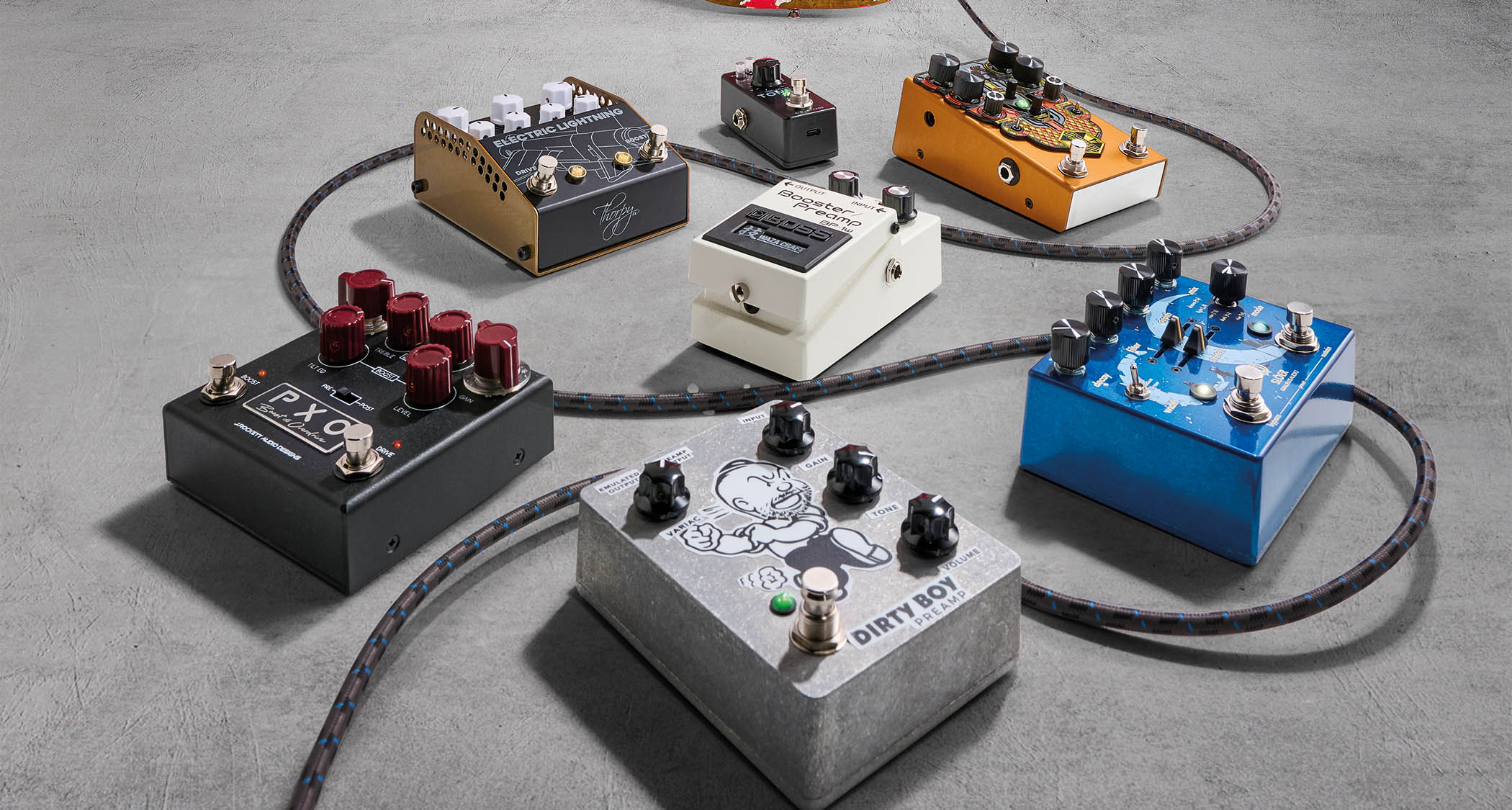
These are great times to be a stompbox fanatic. We are living through another golden age of guitar effects.
Pedal brands are harnessing the power of digital signal processing to bring us ever more radical sounds – and the means to manage them – while also digging into the history of analog circuit design in search of inspiration.
No matter which way you turn, which electric guitar sound you are looking for, there are options. Here we take a look at the last five years in new pedal releases and bring you a Top 30, a little inspiration for your ‘board.
Anasounds/Third Man Hardware La Grotte
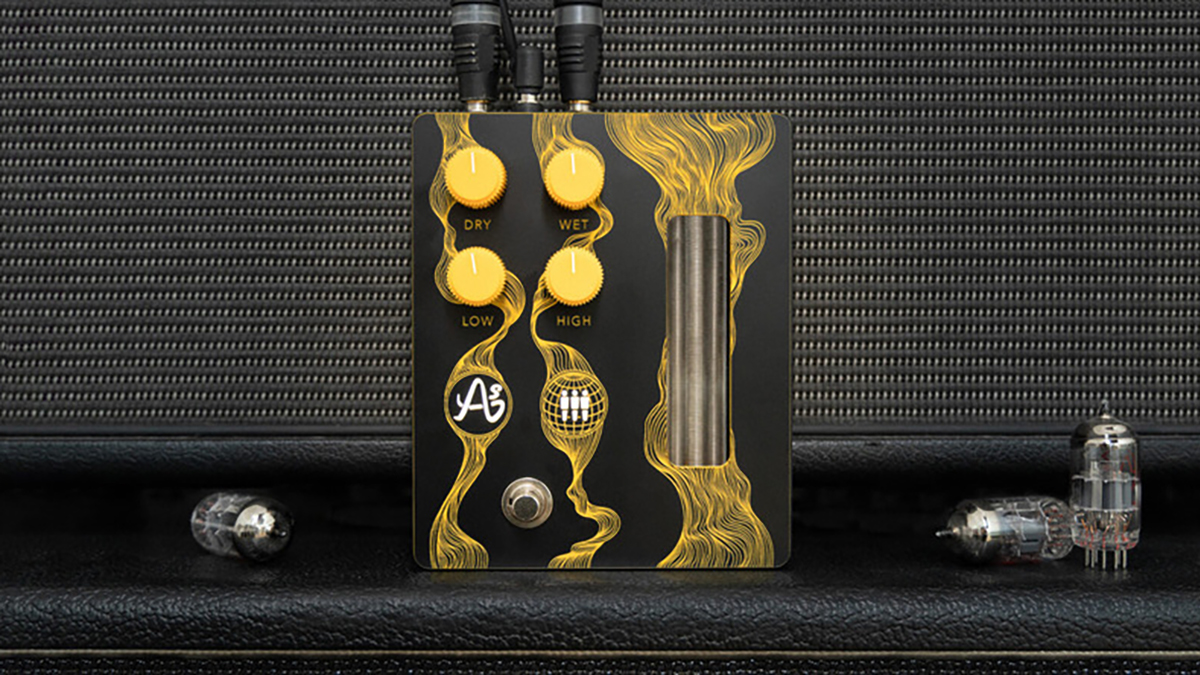
Type: Analog spring reverb
Spring reverb pedals with genu-wine springs in ’em seem to be making a comeback at the moment via interesting pedals such as Crazy Tube Circuits’ White Whale and Gamechanger Audio’s Light reverb. But neither go quite so far into a dark and stormy night of jagged sound as La Grotte (French for ‘The Cave’), made by Anasounds in collaboration with Third Man Hardware and Jack White.
Both the sonics and the features are brilliant, starting with a great-sounding internal preamp based on Tampco’s Tone Oven. The three-spring reverb tank itself is a quality Accutronics/Belton unit and there’s a two-band EQ that influences only the reverb itself.
Lastly, it can be run in either true bypass or buffered mode: with the former, the reverb is shut off abruptly when the pedal is bypassed, but in buffered mode, as Anasounds charmingly puts it, “we leave the tails [to] die with elegance”. Wild, unmissable, and worth it. [JD]
All the latest guitar news, interviews, lessons, reviews, deals and more, direct to your inbox!
Price: $300/£350
Web: Third Man
Beetronics Larva Morphing Phaser
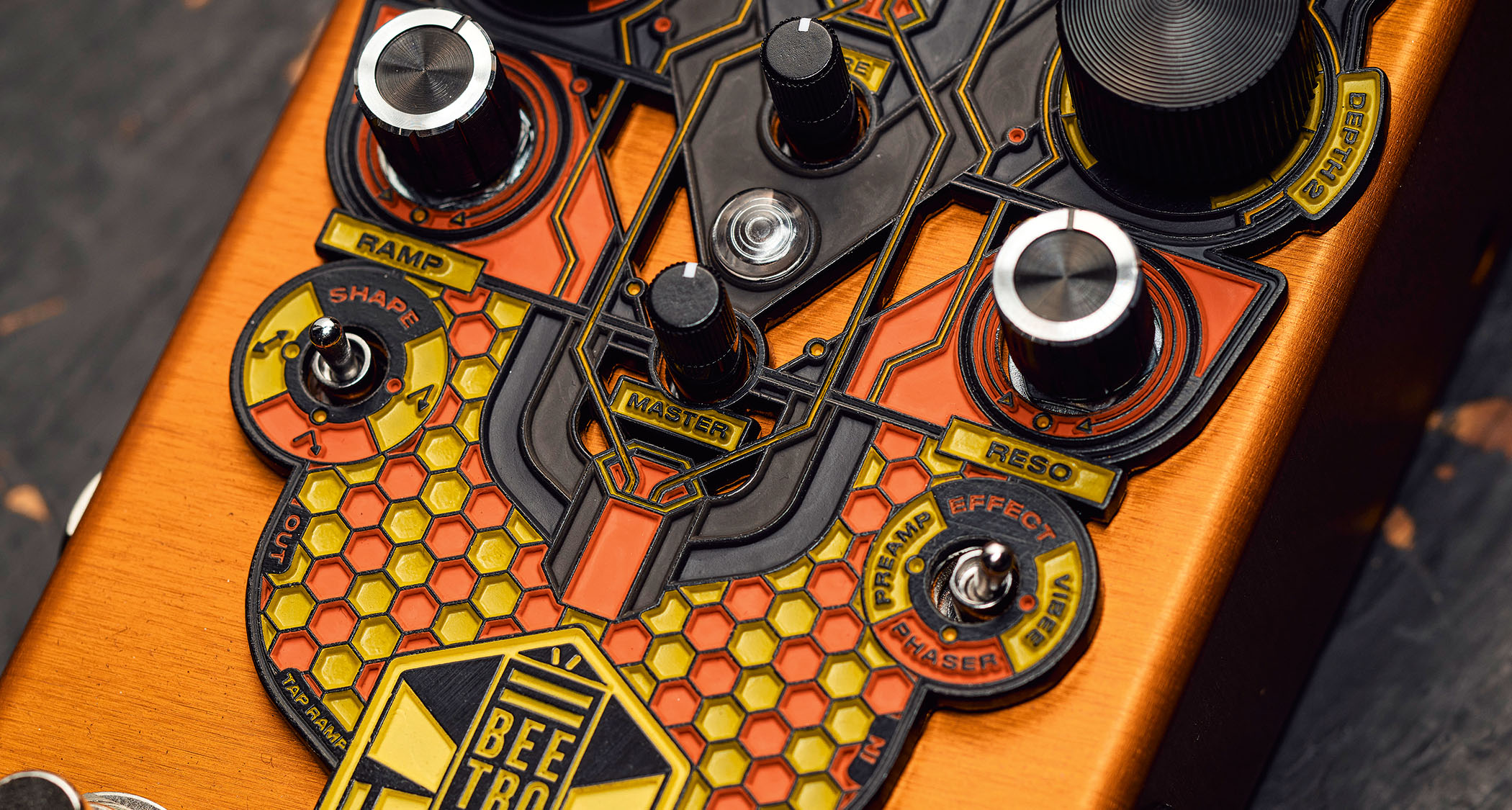
Type: Phaser
You couldn’t walk over any guitar player’s stage in the 1970s without tripping over a phaser, and they are still popular.
However, with all the different modulation effects available these days, many of them packaged in multi-effect pedals, any company bringing out a new dedicated phaser had better make it a bit special – and that’s exactly what Beetronics has done with the Larva Morphing Phaser, a six-stage analog phaser with an element of digital control.
The sounds here are classic 70s phasing or vintage vibrato with adjustable rate and depth, and a resonance knob for greater intensity, all coupled with a preamp that can be turned up to build in valve-like overdrive.
The star feature, though, is that you can footswitch between two presets with a user-selectable ramp shape and speed for the transition for standard switching between the two, evolving transitions from one to the other, or quick momentary blasts. [TC]
Price: $249/£239
Web: Beetronics FX
Benson Stonk Box
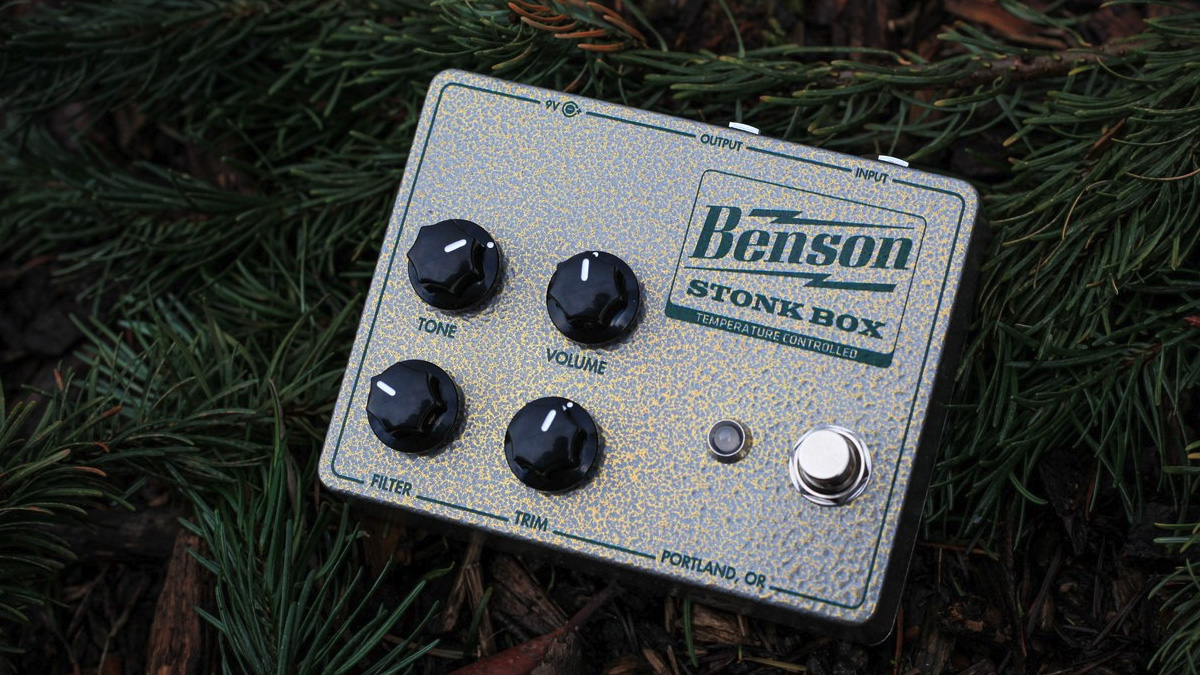
Type: Fuzz
The Benson Amps Stonk Box is a meticulously crafted fuzz pedal that revives the iconic tones of the 1960s while addressing the quirks and inconsistencies of vintage designs.
Inspired by the MKI Tone Bender, it incorporates Benson’s Automatic Thermal Bias technology, continuously monitoring and warming its germanium transistors to ensure consistent performance regardless of external temperatures – this innovation eliminates the notorious temperature sensitivity associated with classic fuzz circuits.

The Stonk Box offers an expanded control set beyond the original MKI, featuring Filter and Volume knobs, along with added tone and Trim controls. This allows for a versatile range of sonic textures, from subtle boost to aggressive, searing fuzz, or smoother, more refined tones.
Never harsh nor congested, tone remains clear, articulate, and musical at any gain level. The Stonk Box offers a full spectrum of stunning vintage fuzz tones with warmth, clarity, and stability. It’s the fuzz pedal you didn’t know you needed. [CW]
Price: £289
Web: Benson Amps
Boss BP-1W Booster/preamp
Type: Boost
There has been a long history of guitarists taking advantage of the preamps in certain equipment – sometimes while using the effects in that unit, sometimes not. Two 70s Roland/Boss units that fall into the category are the CE-1 Chorus Ensemble and RE-201 Space Echo.
While peak-condition original vintage units may be hard to find, not to mention expensive, Boss has made the sound of its preamps accessible to all using analog circuitry in the Waza BP-1W Booster/Preamp.
A three-way toggle switch lets you choose either preamp or a natural transparent sound, while a gain knob can add grit to the Level knob’s output volume.
In the world of boost pedals, the choice of three boost options – particularly the two preamps each bolstering the midrange while adding their own distinct character – makes this not just versatile but also a gateway to some vintage tone enhancement for your signal chain. [TC]
Price: $186/£149
Web: Boss
Boss HM-2W Heavy Metal
Type: High-gain distortion
The word ‘icon’ is much over-used, but the original Boss HM-2 truly deserves it. Made in Japan then Taiwan, from 1983 to 1991, it found its calling in the nascent Swedish death metal scene of the early 90s, and its uniquely malevolent ‘chainsaw’ sound is still coveted among metallers.
Unlike the tight and focused noise-gated metal distortions on the current market, the HM-2 sounds more like the unholy union of a cranked Rat and an old Shin-ei fuzz, with a staggeringly powerful two-band EQ and an avalanche of barely controllable, seething distortion.
Made in Japan once again, Boss’s superb Waza Craft reissue recreates the HM-2 to modern standards – with more volume, better buffering, and less noise – while also adding a whole new Custom mode that caters to down-tuned players with increased low-end punch. Nothing blasts its way to the front of a mix quite like it. [CF]
Price: $164/£159
Web: Boss
Boss SDE-3 Dual Digital Delay
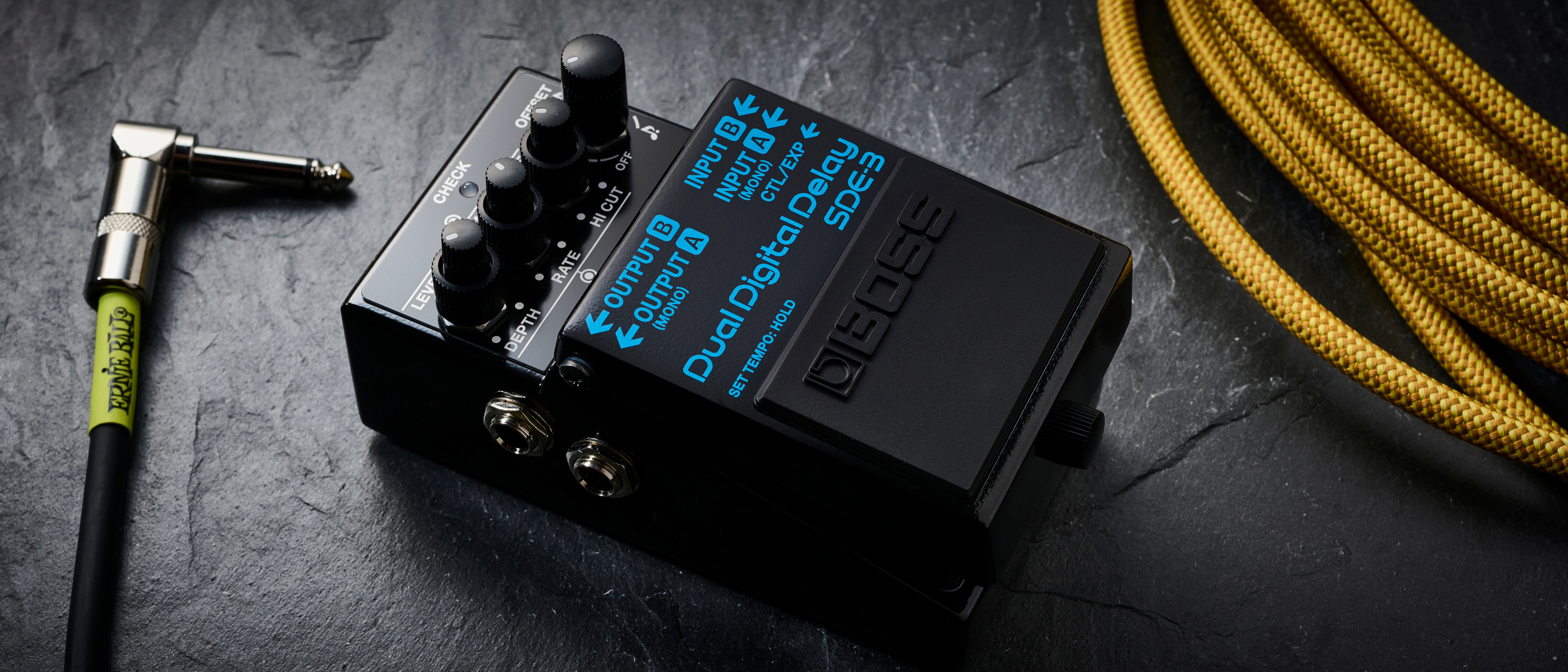
Type: Delay
The SDE-3 stands apart from other compact delays in that it can give you two delays in parallel, the second one offset from the first by a user-adjustable amount. It's based on the classic 1980s SDE-3000 rack mount unit and features the warm and smooth sound found in the 16-bit original.
There’s 1,600ms of delay in mono, 800ms in stereo, modulation with Rate and Depth knobs, plus the usual delay Time and Feedback knobs, and a Hi Cut control for the repeats to make subsequent repeats darker, enabling a long trail of repeats to better blend into your sound.
Whether you dial in chorus and flange sounds, very short offset delays for thickening things up, or a longer offset where the relationship between the two delays can deliver a distinct pattern, you’re getting a source of classic 80s digital delay sounds with instant hands-on tweakability that will fit on any pedalboard. [TC]
Price: $241/£162
Web: Boss
Browne Amplification Protein Dual Overdrive V4
Type: Dual overdrive
The Protein Dual Overdrive V4 houses two independent overdrives: the ‘Blue’ side, inspired by the Marshall Bluesbreaker, and the ‘Green’ side, modeled after the Nobels ODR-1, both with tweaked circuits and more gain.
These can be used independently or stacked for a total of three different gain levels. This fourth iteration of the Protein introduces a three-way Hi-Cut switch to the Blue side for more tonal options and versatility. Unlike many overdrives that sacrifice bottom-end for definition, the Protein retains a full-bodied low-end while keeping note articulation intact, and never becomes overly compressed or lifeless.
What truly sets the Protein apart is its transparency, which makes it feel like a natural extension of your amp without feeling like you’re playing through a pedal. The Protein isn’t just about more gain, it wakes up your amp – adding depth, sustain, and responsiveness without losing what makes it special. [CW]
Price: $349/£339
Web: Browne Amplification
Caroline Guitar Company Wave Cannon Zero
Type: Distortion
First of all, who wouldn’t want a pedal called the Wave Cannon on their ’board? Second, it’s a versatile, beautifully made, and highly original distortion that sounds amazing at any level of gain, from jangling light overdrive to a crushing wall of noise.
While loosely based on classic op-amp distortion circuits such as the DOD 250 and Pro Co Rat, the Cannon adds extra controls for shaping the EQ and the gain structure – and then there’s the Havoc switch. Originally a happy accident on the workbench, this is a secondary footswitch that generates wild feedback, warped and shifted by the knobs or even your guitar’s controls.
The latest Wave Cannon Zero offers a voltage starve control for those dying-battery fuzz sounds, as well as a whole extra control specifically for tweaking the Havoc feedback – for those who tend to close their band’s set by kneeling down on stage, creating apocalyptic noise. [CF]
Price: $249/£279
Web: Caroline Guitar
Chase Bliss Automatone Preamp MK II
Type: Preamp pedal
This groundbreaking collaboration with Benson Amps integrates Benson’s preamp circuitry with advanced digital control.
The sleek brushed aluminum chassis and wooden side panels give the Automatone a high-end, studio-grade aesthetic reminiscent of vintage recording consoles, while motorized faders for EQ, volume, and gain physically adjust to match saved presets, delivering instant visuals of your settings.
The pedal features MIDI, 30 presets, and extensive tonal shaping via push-button switches – Jump, Mids, Q, Diode, and Fuzz – each with three distinct settings. These controls allow for extensive customization of gain staging, midrange, bandwidth, clipping diode configurations, and fuzz, while delivering exceptional sound quality.
Dialing in tones from clean to fuzz is incredibly easy and it’s certainly a blast watching the faders move by themselves when a preset is selected. The Automatone MK II redefines stompbox preamp functionality, making it one of the most advanced pedals for stage or studio. [CW]
Price: £580
Web: Chase Bliss
CopperSound/Third Man Hardware Triplegraph
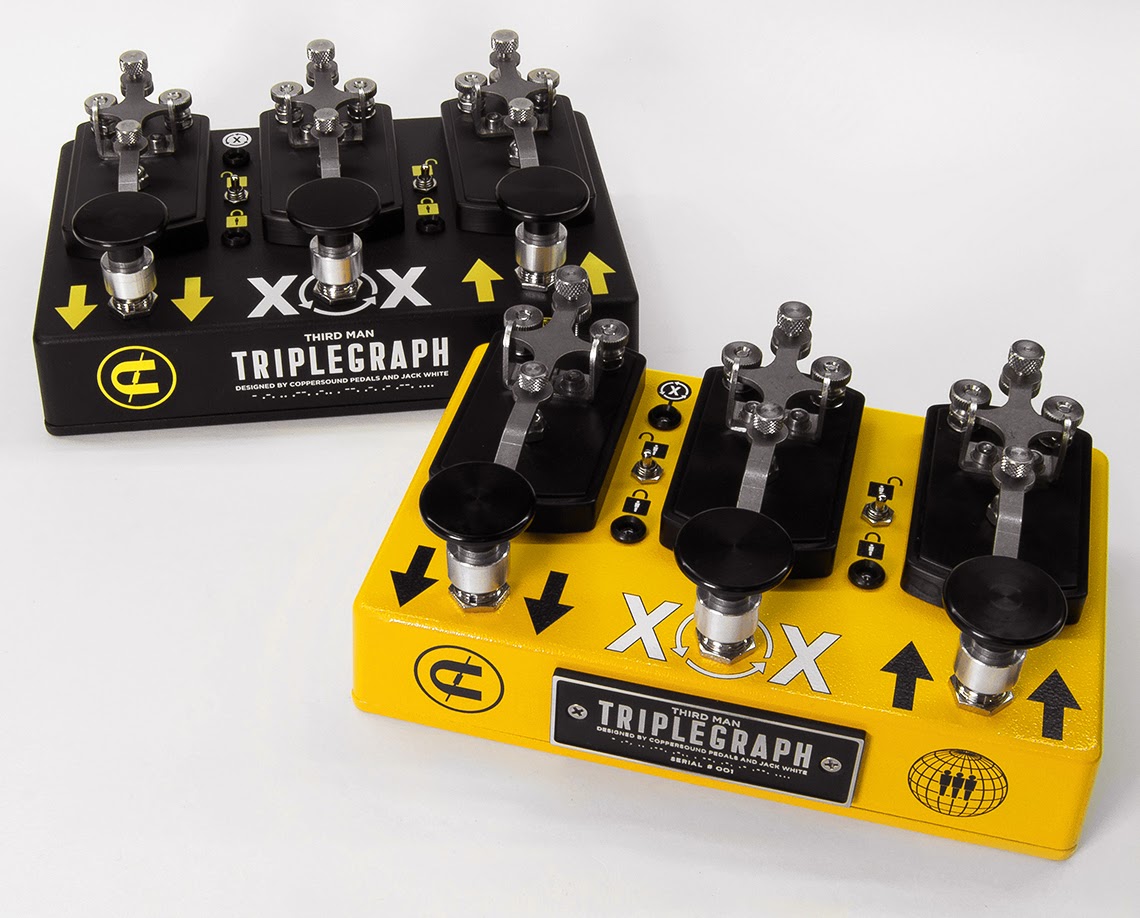
Type: Digital octave/killswitch
Gear that’s associated with Jack White is almost guaranteed to be brilliantly strange, and the Triplegraph – designed by CopperSound Pedals and Jack White – is no exception.
What we have here is a triple-width unit boasting three large and elaborate piano pedal-esque footswitches, controlling an advanced DSP unit that offers a perfectly tracking lower octave, upper octave, and, most interestingly, a kill circuit to cut out the dry signal of your guitar, leaving only the effect signal.
Then, when combined with the pedal’s built-in effects loop, you can use the killswitch to hear momentary bursts of your other pedals, in parallel with the octave signal.
Combine the Triplegraph with modulation for organ-esque sounds, or with fuzz for instant octave-doubled sludge, or any number of more leftfield effects to create… well, who knows?
The possibilities for sonic experimentation are endless, and there are sounds to be found here that you simply may not be able to achieve by any other means. [CF]
Price: £325
Web: Third Man
Crazy Tube Circuits Hi Power Type: Drive/boost
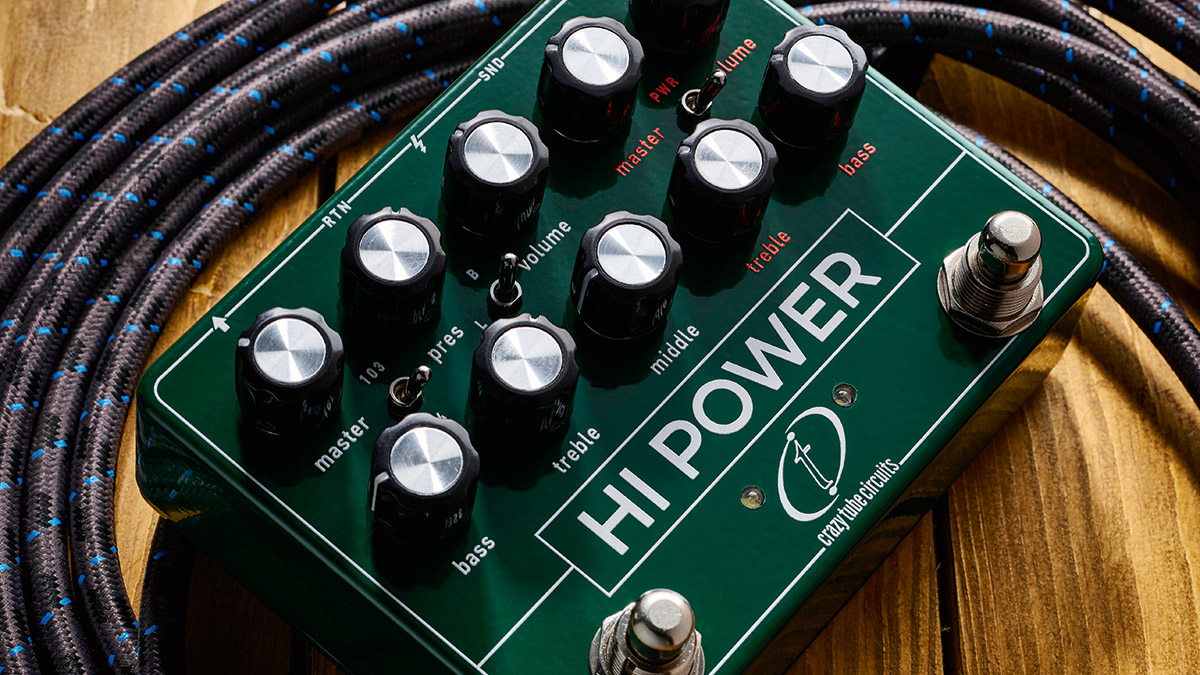
Type: Drive/boost
David Gilmour’s soaring leads and glassy cleans are legendary, and Crazy Tube Circuits’ Hi Power attempts to bring those tones straight to your pedalboard, combining a Hiwatt-style preamp with a Colorsound Power Boost recreation.
The Amp section models the Hiwatt DR103 and DR504, offering Normal and Bright channel inputs along with a Linked setting that blends the two channels for increased gain and punch. The Boost circuit lets you choose between 18 volts for aggressive drive and a nine-volt Overdriver mode for smoother break-up.
Other features include four-band EQ on the Amp side, Bass/Treble controls on the Boost side, Master Volume, and a send/return loop to integrate other pedals. The moment you engage the Boost, those familiar soaring lead tones pour out of your speakers with endless sustain.
With the Hi Power, you’re practically getting a Gilmour tone cheat-code – it’s got punch, sustain, and an expressive lead voice that never stops singing. [CW]
Price: $300 approx/£235
Web: Crazy Tube Circuits
Crazy Tube Circuits White Whale II
Type: True spring reverb & tremolo
“My multi-effects unit has spring reverb in it, though!” Not like this, it doesn’t. Crazy Tube Circuits’ White Whale II squeezes a genuine spring reverb tank into a pedalboard-friendly format.
But it’s not just taking inspiration from vintage amps for its ’verb sound; CTC is also looking to the 50s and 60s for its tremolo sounds, too. The reverb features a triple-spring tank that can provide ‘short’, ‘medium’ (both using two of the three springs), and ‘long’ reverb times.
You can adjust the Dwell control to send more or less of your guitar signal into the springs, and the tone control can take you from bright and bouncy to smooth and vintage, with a Mix control blending the reverb amount. Pair it with the three-mode tremolo, which now includes a golden-era-inspired Harmonic mode, and you’ve got authentic depth and character to hand for any amp. [SW]
Price: £299
Web: Crazy Tube Circuits
Dinosaural Cogmeister
Type: Drive pedal
Gain-staging by stacking up several complementary drive pedals is the route to flexible tonal nirvana for many guitarists. But what if all the gain stages were in one box, rather than separate individual pedals? That is exactly what the quite unique triple-footswitch Cogmeister gives you.
At its heart is the Drive section with a three-position Shift switch for three distinct midrange contours reminiscent of different amp types, and that is preceded by the Push 60s-style silicon transistor treble booster and tailed by the Solo section for boost and/or extra gain at the end of the chain, both with eminently practical EQ options.
The three sections can be used singly or in any combination and – set up to complement each other – could provide all your shifting gain needs on stage. Beyond that, the pedal is also capable of building a massive range of composite drive, distortion, and fuzz sounds. [TC]
Price: £349
Web: Coggins Audio
Dirty Boy Co Dirty Boy preamp
Type: Analog preamp pedal
Based on an amplifier designed by Alex Saraceno (father of guitarist Blues Saraceno), the Dirty Boy all-analog preamp pedal is a flexible powerhouse with a variety of roles. Essentially an amplifier simulator in pedal form, the Dirty Boy preamp features two outputs.
The first delivers the raw sound of the preamp for use with a power amp and speaker setup, plugged into the effects return of a conventional guitar amp, or as a conventional boost/drive stompbox in front of an amp.
The other output, featuring speaker emulation based on a 4x12 Celestion Greenback cabinet, is for connection to a mixing desk or PA for live use, or to send a signal to a DAW for recording.
The sound is that of rock tones from cleanish through to full-on raunch, tempered via a tone knob and a Variac knob for simulated voltage variation. Slip one of these into your gigbag and you’ll be covered for responsive amp/drive sounds in any situation. [TC]
Price: £264
Web: Dirt Boy
EarthQuaker Devices/Death By Audio Time Shadows II

Type: Multi-delay
Plugging into the Time Shadows II feels like stepping into an alternate sonic dimension. A wild collaboration between EarthQuaker Devices and Death By Audio, this pedal isn’t just about delay; it’s about warping time and exploring uncharted territories.
The three-way Mode switch is the heart of this adventurous pedal. The EQD Mode twists notes into a sub-octave, fuzzed-out cluster, while the DBA Mode ricochets echoes into filter-drenched chaos. And then there’s the Way Out There !¡ mode, where each repeat warps unpredictably, morphing into an infinite loop of altered, psychedelic chaos.
With six preset slots and intuitive knobs for Time, Span, and Filter, sculpting sound and bending reality is effortless. Pushing gentle repeats into swirling textures or creating ghostly overtones is not only a breeze, it’s downright addictive. Conventional delay lovers beware: this one doesn’t just repeat your notes, it mutates them into lovely unexplainable madness! [CW]
Price: $219/£249
Web: EarthQuaker Devices
Empress Effects Zoia
Type: Synth pedal
The Zoia is unlike any other effect pedal you’ve seen. Instead of a normal array of knobs and switches, there’s a grid of 40 buttons. The reason for this is that the pedal is effectively a modular synthesizer and each button represents a module that you can link to another.
Basically, these are the building blocks for creating whatever custom effect you want, and 22 of the modules currently cover all standard guitar effects including an EQ, overdrive/distortion, fuzz, compressor, noise gate, phaser, flanger, chorus, vibrato, Uni-Vibe, tremolo, envelope filter, ring modulator, and cab simulator, along with three delays and five reverbs.
The Zoia excels at large, complex sounds and uniquely detailed effects of an experimental nature that you can save in 64 onboard memories. There’s a bit of a learning curve here, but stick with it and this one pedal can really take your musical vision to another creative level. [TC]
Price: $549/£539
Web: Empress Effects
Friedman IR-X
Type: Valve preamp pedal
The growl and feel are right, but the amp is nowhere in sight. The Friedman IR-X is a pedalboard-friendly amp-in-a-box, designed for direct-to-PA and recording setups, featuring two high-voltage 12AX7 valves delivering British high-gain tones that Friedman amps are known for.
It’s loaded with features combining two channels (Clean and Overdrive) with independent gain, volume, EQ, IR loader, effects loop, DI, MIDI, headphone outputs, and a Boost switch. Power Amp Simulation helps the IR-X create authentic valve amp response that pushes air and feels great under your fingers, while Bright and Tight switches allow further tone shaping.
The impulse responses are incredibly realistic and quite convincing through studio monitors or a live PA system. This pedal easily captures the feel, dynamics, and responsiveness of a cranked valve amp. In fact, it’s so close to the real thing that you may question whether you really need that full stack. [CW]
Price: $499/£419
Hamstead/That Pedal Show Redwing
Type: Modulation
There are many ways to get your modulation sounds running – from dedicated single effects pedals to all-encompassing multi-effects units – but the Redwing is something quite different. This all-analog stereo modulation pedal offers instant hands-on control of all the parameters you need to dial in your own modulation effects.
There’s a massive range of subtlety in what you can create here, whether you’re trying to emulate a vintage effect or are looking to create something that fits your exact sonic needs
Inspired by BBD devices such as Boss’s CE-1 Chorus Ensemble and the Electro-Harmonix Electric Mistress flanger, it can deliver those classic tones and beyond while being much better suited to function within a modern rig than vintage pedals.
The unit creates variations on flanging, chorus, vibrato, ring modulation, and rotary speaker sounds by using two independent BBD delay lines that are modulated by analog waveform generation.
There’s a massive range of subtlety in what you can create here, whether you’re trying to emulate a vintage effect or are looking to create something that fits your exact sonic needs. [TC]
Price: £429
Web: Hamstead Soundworks
IK Multimedia Tonex One
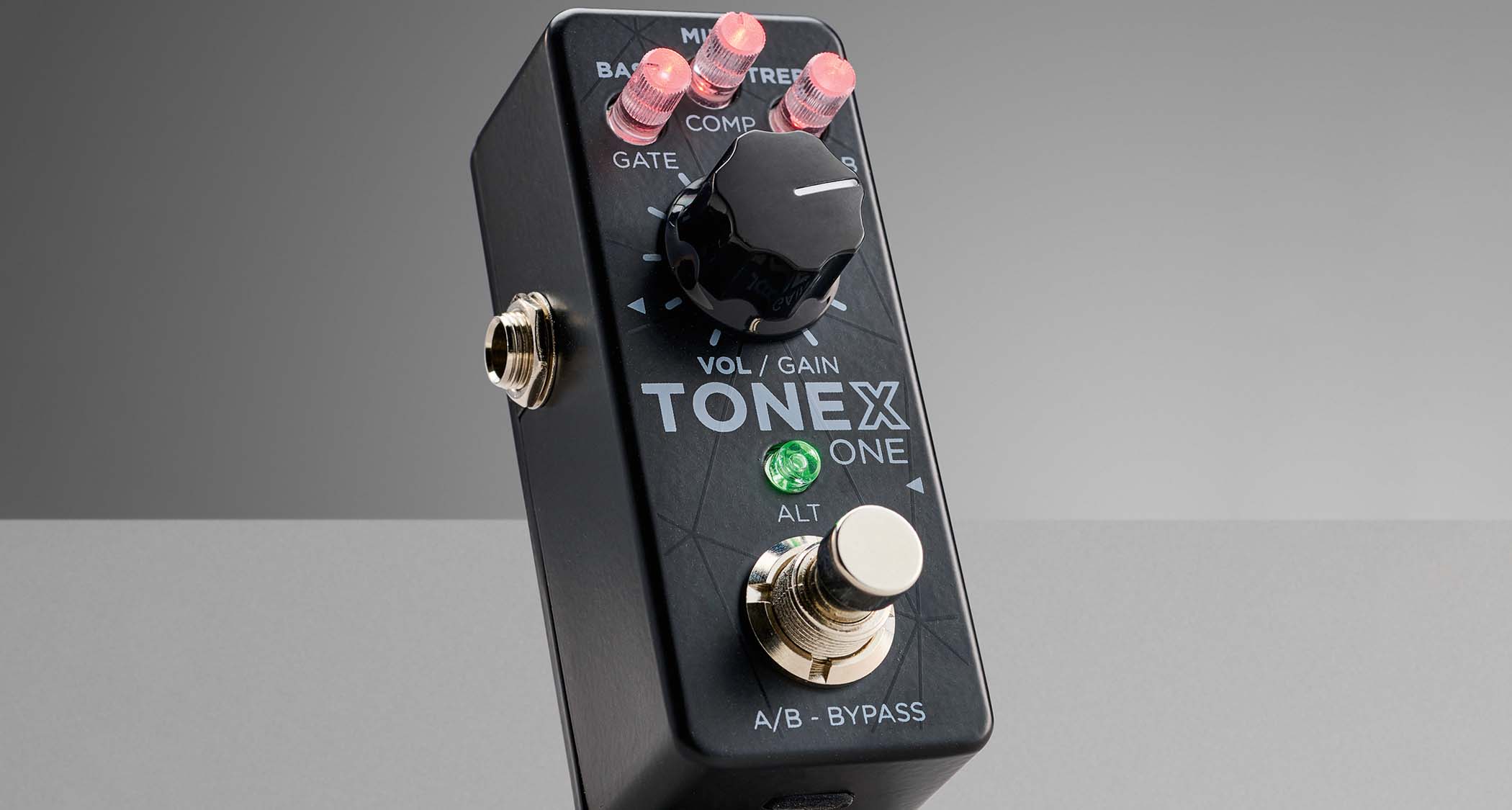
Type: Amp sim & drive
The Tonex One is a real gamechanger – a tiny pedal that uses ‘AI Machine Modelling’ technology for access to a massive range of rigs and stomps for use in different scenarios.
The software captures the sound of rigs comprising various combinations of amps, cabinets, and drive pedals, and Tonex One will let you incorporate those into your rig for use on stage and beyond.
It comes supplied with the Tonex SE software, which offers instant access to 200 of IK’s Tone Models but also gives you access online to ToneNET, where unlimited Tone Models are created and shared by other users.
You can feed amp and cab sounds directly into a PA, use it for recording via its USB output, or even practice via its headphone output. Alternatively, it can act as a standard fuzz/distortion/drive pedal on your ’board. [TC]
Price: $/£149
Web: IK Multimedia
J Rockett PXO
Type: Drive & boost
This signature pedal for Bon Jovi guitarist Phil X features independently-footswitched Boost and Drive sections that can be stacked in any order.
Two-band EQ in the drive section offers a practical range of tones to match pickups and amp, and the range of drive runs from low-level raunch through to full-on cranked-stack rock sound with plenty of compression.
Tonal variation via the boost section’s Tilt EQ offers an easy way to set a treble and bass balance for the boost that runs from unity gain to oodles of poke.
Combining the two sections, a Pre/Post switch determines whether the boost pushes the Drive section that little bit further into distortion or comes after it to give you a lift in volume, both instances having the benefit of that EQ tilt if needed. With more flexibility than most in its genre, this is a very practical addition to your pedalboard. [TC]
Price: $349/£359
Web: J Rockett
Keeley Noble Screamer
Type: Multi-mode overdrive
Overdrive fans often get caught in the same debate: Nobels ODR-1 or Ibanez Tube Screamer? Keeley’s answer? The Noble Screamer! Here, Keeley has combined two classic overdrive circuits, but there’s a twist.
The Noble Screamer can mix ’n’ match the clipping and tone sections of each of its inspirations, offering a four-in-one overdrive. The clipping mode switch takes you from hard diode clipping in the OD setting, to more gentle, soft clipping in the TS position.
Similarly, the OD/TS toggle in the tone section changes the tone control’s response from a flat-to-smiley-face EQ in the OD position, to a low-pass filter for removing high-end when TS is selected. It can be buffered or true bypass (switchable without having to get inside the pedal casing) and maintains the simplicity of a three-knob (gain/volume/tone) overdrive.
We’ve got one in our shopping cart for under £200 as we type – and, at that price, it’s worth every penny. [SW]
Price: $/£199
Web: Keeley Electronics
Keeley Octa PSI Transfigurating Fuzz
Type: Fuzz/Pitch-shifter/octaver
Fuzz and octave effects are a classic pairing, but Keeley’s Octa PSI takes things to a whole new level.
First up, we get a 100 percent analog, multi-stage transistor-based fuzz circuit with gain, level, and tone controls. In addition to this, a toggle switch gives instant access to three tonal shapes (Punch, Scoop, and PSI).
Then there’s the polyphonic octave/pitch-shifting side of the pedal, which gives plus/minus two-octave range. A second toggle allows for up/down and dual modes, but the real fun comes when combining the two sides. Here, we can change the signal chain order, configure the output to all wet or dry/wet, and engage the pitch side momentarily (including ramp speed) for instant Whammy-style pitch jumps.
Keeley has taken the fuzz/pitch combo and bundled it into a new, highly flexible, and creative pedal that serves up more beef than McDonald’s. [SW]
Price: $228/£265
Web: Keeley Electronics
Origin Effects RevivalDrive Compact
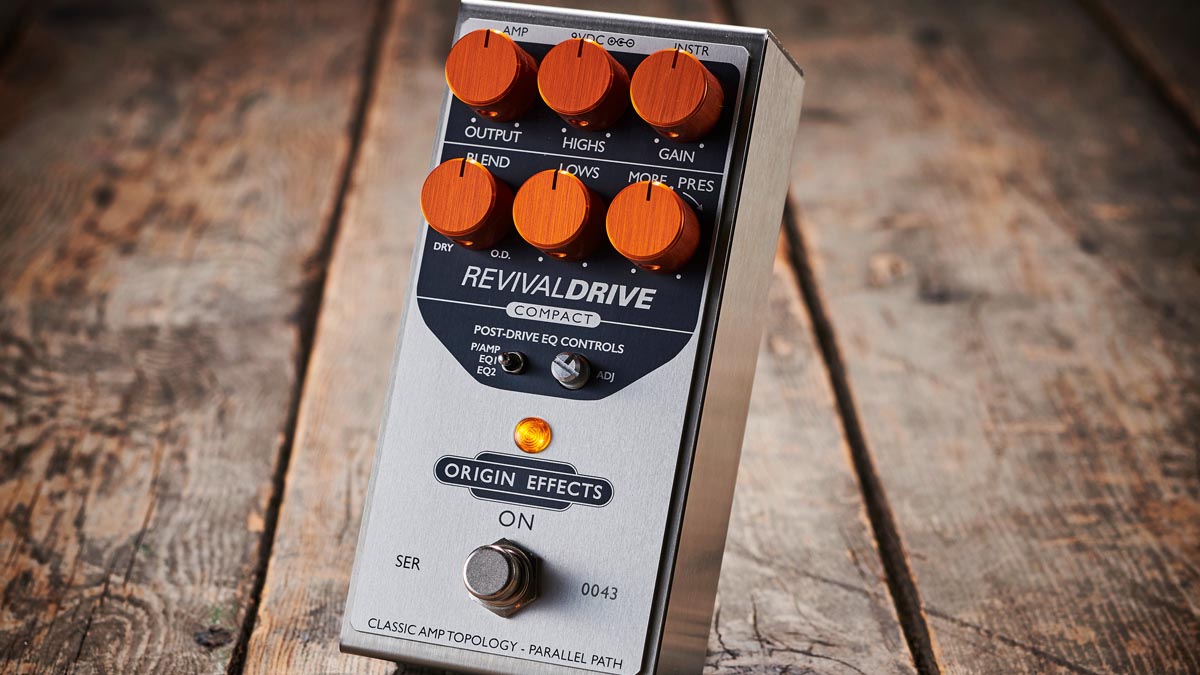
Type: Drive
There are myriad digital amp-simulation pedals out there using modeling, but what makes the RevivalDrive Compact stand apart from that crowd is that it recreates amp sound by replicating every stage of a valve amp’s signal path using all-analog components.
A smaller, more pedalboard-friendly version of the ‘big box’ RevivalDrive, the Compact has a much more streamlined set of controls, making it easier to dial in the sounds you need while retaining the essence of its sibling’s sound and exhibiting the same excellent touch-sensitivity.
Amp sounds from clean to cranked are available, including vintage Fender and Marshall flavors, while a Dry knob opens up a world of blends if you’d like to retain more of your own amp’s character.
Add this superbly engineered pedal to your rig to get some authentic-sounding vintage amp tones and overdrive that’s entirely in tune with the sound of your own amp. [TC]
Price: $419/£329
Web: Origin Effects
Soldano SLO Pedal
Type: Amp-in-a-box overdrive
Mike Soldano’s SLO (Super Lead Overdrive) amp has been revered since the 80s thanks to its high-gain performance: dripping in thick harmonics while maintaining definition and power, it’s sure to feature on the Mount Crushmore of gain.
But it’s 2025 now and our backs hurt… Never fear, the SLO Pedal is here. Built to replicate the amp’s response, the pedal makes use of cascading gain stages to build up the heavy without compromising on clarity and detail.
This means that even if you’re not looking to singe Spandex, you can still achieve the thick, smooth gain we’re used to from the SLO’s amp counterpart.
It’s a relatively straightforward pedal in terms of operation, delivering the familiar gain, volume, three-band EQ, and Presence controls as found on the amp. One input, one output, and a power jack later, and you can be enjoying the Soldano sound straight from your ’board. [SW]
Price: $/£199
Web: Soldano
Thermion Stone Age
Type: Multi-fuzz
There’s so many fuzz pedals out there that it’s almost a relief Spanish effects maker Thermion has put nearly everything you could possibly want into this hugely versatile pedal that covers the classic sounds and throws in a few more tone-sculpting tools that weren’t around in the 60s.
It offers four brilliant-sounding fuzz voices that roughly equate to an early 60s fuzz voice, a Maestro FZ-1-inspired fuzz, a Fuzz Face, and a Big Muff-style distortion-fuzz.
But it’s the added features that really make the Stone Age a treat – there’s a footswitchable ‘Add Clean’ control that allows you to blend back in some of your dry signal for overdrive-like hybrid tones, High and Low Cut controls, plus a footswitchable Octave effect – for those fluting, robotic Purple Haze solo sounds. In short, it’s a rich suit of fuzz tones with all the tailoring tools you need to cut your cloth exactly how you like it. [JD]
Price: £249
Web: Thermion
ThorpyFX Electric Lightning
Type: Valve-based drive & boost
The design brief for this Chris Buck signature pedal was for a one-box solution to deliver Buck's own sound no matter what backline he had access to.
The result, the Electric Lightning, features a valve-based overdrive circuit fed by a high-headroom clean boost, each independently footswitched.
Covering a wide range of tonal outcomes with a three-knob EQ similar to a Marshall tonestack, the Drive runs from a just-beyond-clean crunch right through to full-on heavy raunch, all with crisp string articulation and an excellent dynamic response that lets you coax out the cleaner sounds with softer strokes while digging in for the dirt.
The Boost has plenty to kick that up a notch and features a Lows knob that can roll the bass off for something leaner and tighter. Delivering real valve sound in a practical package, you can pair this with just about any clean amp to deliver all the drive sounds you’ll need. [TC]
Price: £429
Web: ThorpyFX
Universal Audio Starlight Echo Station
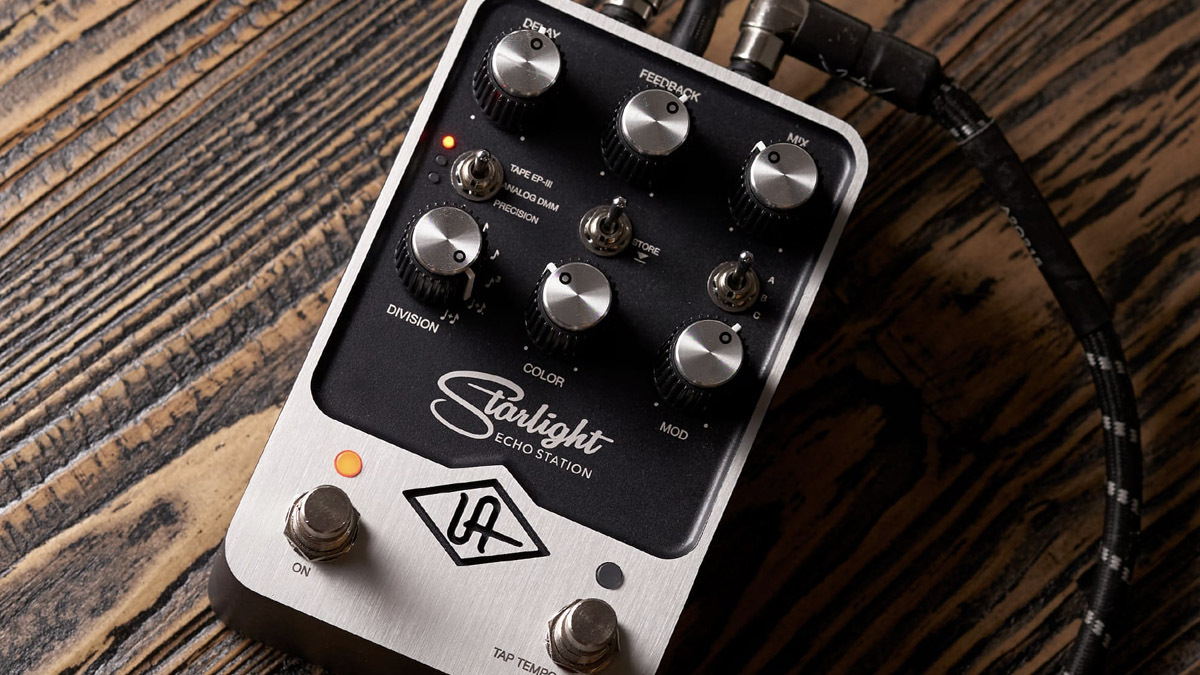
Type: Delay
The Starlight Echo Station is a studio-grade recreation of classic tape, analog, and digital echoes crafted with Universal Audio’s legendary precision.
With three different echo/delay emulations – Tape EP-III, Analog DMM, and Precision – the Starlight captures everything from warm, warbling tape echoes to lush analog repeats and pristine studio-grade delays. The Time, Feedback, and Mix controls shape your echoes, while the Color knob dials in tape age, modulation, or other tone characteristics depending on the mode.
Additional features include tap tempo and preset storage. Unlike many time-based effects, the Starlight sounds astonishingly good in the effects loop or in front of your amp.
Each emulation is alive with nuance, capturing the quirks, warmth, and characteristics of iconic delay units. Tape EP-III (Echoplex-style tape delay) has one of the warmest, smoothest echo effects for nailing those hard-to-recreate tones from the early Van Halen records. The Starlight nails it! [CW]
Price: $299/£379
Web: Universal Audio
Vertex Steel String Supreme
Type: Amp-style preamp
With news that Dumble amps are to resume production in extremely limited numbers, it’s an apt moment to try this superb pedal inspired by Dumble’s legendary 150-watt Steel String Singer amp – of which only 12 examples were made, most famously used by Stevie Ray Vaughan.
Vertex Effects of California built on its already great Steel String MKII amp-in-a-box pedal to expand the tonal nuance of this concept in the Steel String Supreme (Slight Return Edition), which features two rows of controls.
The bottom three are the same as those that featured on the original Steel String (Level, Filter, Gain), controlling the same circuit, but above these are five new controls governing tonal qualities such as the depth, fatness, and brightness of the tone.
Nuanced, airy, dynamic, and rich, this is a Dumble-apeing preamp everyone should try, and it can be used direct into cab sim/IR loaders, too. [JD]
Price: $249/£227
Web: Vertex Effects
Walrus Audio Qi Etherealizer
Type: Multi-Effects
Developed with guitarist Yvette Young, the Walrus Audio Qi Etherealizer multi-effects pedal combines chorus, delay, grain, and reverb into a highly versatile sound-shaping tool.
With 12 rotary knobs and three footswitches, it may look intimidating, but it’s actually easy to use. Two chorus modes provide immersive modulation, while the delay provides up to two seconds of repeats. The grain effect creates glitchy textures using Grain Cloud and Phrase Sample modes – and twisting random knobs can be quite entertaining, yielding a wide variety of unexpected sounds.
Additional controls include individual Mix knobs for each effect, Dry/Mix knob for series/parallel routing, and Space and Tone for shaping Reverb. With MIDI support, preset storage, freeze function, and stereo capabilities, the QI Etherealizer unlocks limitless creative potential.
Its innovative fusion of synthesized sounds, modulation, and time-based effects pushes the boundaries of sound design, inspiring everything from ambient textures and dreamy soundscapes to unpredictable experimental sounds. [CW]
Price: $/£449
Web: Walrus Audio
Walrus Audio Slöer
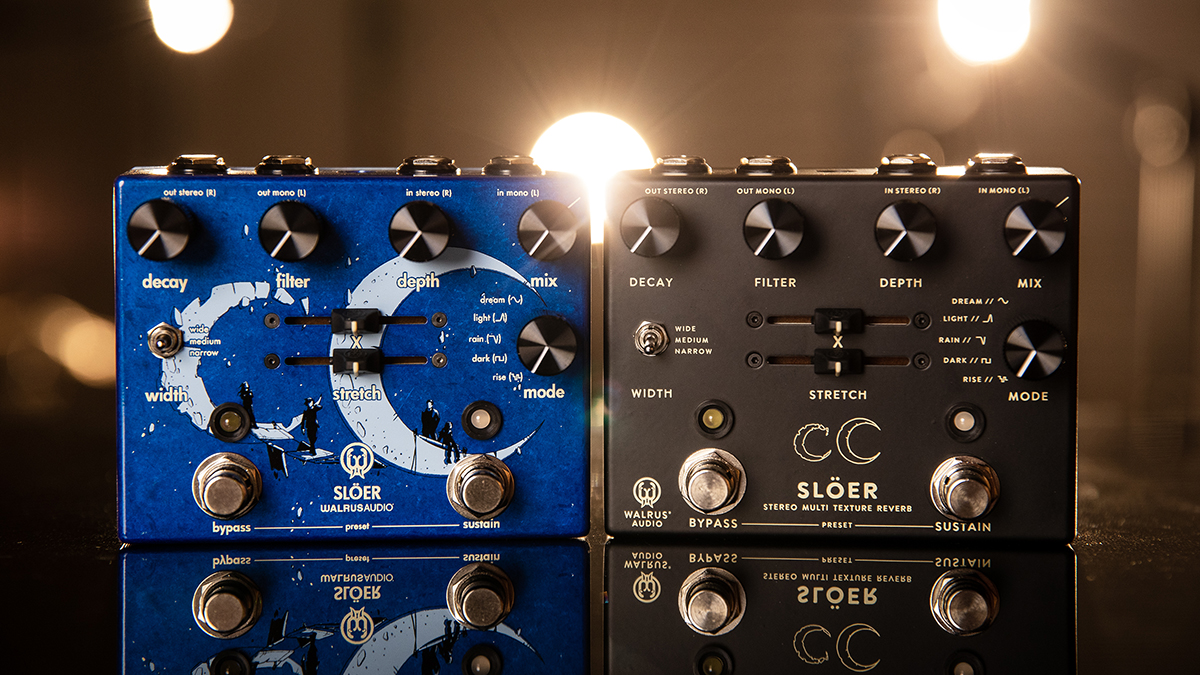
Type: Reverb
For musicians looking to explore their creative boundaries, a good reverb pedal can open up a world of tonal possibilities. The Walrus Audio Slöer is an ambient stereo reverb pedal that offers an impressive range of tonal possibilities for those looking to explore atmospheric soundscapes.
It includes five distinct reverb modes (Dream, Light, Rain, Dark, and Rise) that bend and shift time into unique textures. The X and Stretch sliders allow for fine-tuning effects like vibrato depth and decay times, while a three-way toggle lets you choose between wide, medium, and narrow stereo width.
For a quick burst of effect, the Momentary Switch function activates the Slöer only while you’re pressing the footswitch. Additionally, three presets can be accessed via footswitch for easy recall. With every twist of a knob, the Slöer transforms and delivers deep, complex, haunting yet beautiful ambient textures that never fail to surprise. [CW]
Price: $349/£339
Web: Walrus Audio
- This article first appeared in Guitarist. Subscribe and save.
- Jamie Dickson
- Stuart WilliamsDeputy Reviews Editor
- Trevor Curwen
- Connor Flys
- Charlie Wilkins
You must confirm your public display name before commenting
Please logout and then login again, you will then be prompted to enter your display name.






![Crazy Tube Circuits Hi Power [Hiwatt In A Pedal? - Effector Du Jour] - YouTube](https://img.youtube.com/vi/BtEFSAo-sHE/maxresdefault.jpg)















